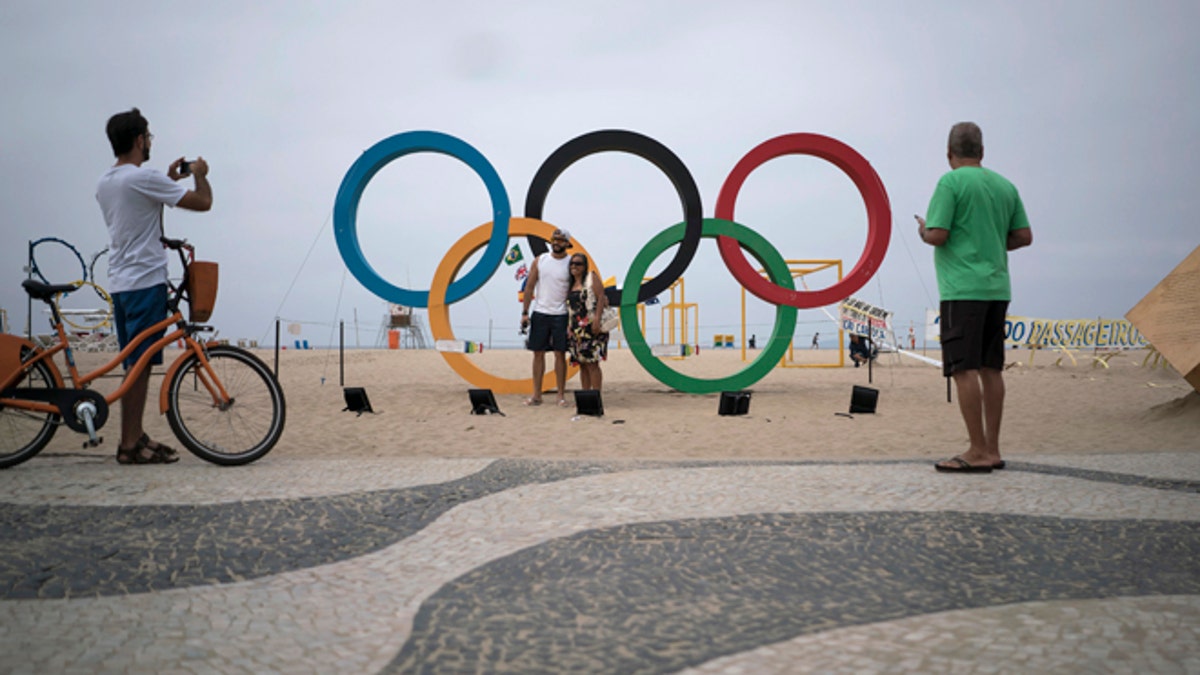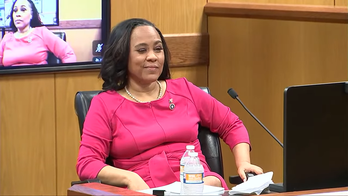
In this July 25, 2016 photo, people take photos by the Olympic rings decorating Copabana Beach in Rio de Janeiro, Brazil. In the city's 2009 Olympic bid document, authorities pledged the games would 'regenerate Rio's magnificent waterways.' A promised billion-dollar investment in cleanup programs was meant to be among the games' most important legacies, but once more, the lofty promises have ended in failure. (AP Photo/Felipe Dana)
Seven years ago when Brazil’s then-President Luiz Inácio Lula da Silva announced that Rio de Janeiro would host the 2016 Summer Olympic Games on the city's famed Copacabana beach, there was the feeling in the air that something momentous was about to happen in the South American nation.
Lula promised Brazilians that the Olympics and the 2014 World Cup would showcase the country as an emerging power on the world stage that could stand shoulder-to-shoulder with the likes of the United States, Western Europe and Russia.
For Brazil, he suggested that day in 2009, the sky was the limit.
Now that the Rio Olympics are just around the corner, however, it's more like the sky has fallen.
“The idea that Brazil was going to become a global superpower was always a bit exaggerated,” Paulo Sotero, director of the Brazil Institute at the Woodrow Wilson Center in Washington, D.C., told Fox News Latino. “If we knew in 2009 what we know now, we probably wouldn’t be having the games [in Rio].”
Brazil is now engulfed in its deepest recession in 100 years, dealing with the biggest corruption scandal in its history and the country's most turbulent political shake-up since the return to democracy in the 1980s, facing a major health epidemic as the Zika virus continues to spread and experiencing a spike in violent crime in many of its urban areas.
For athletes and observers of the Olympic Games, the most glaring issue facing the Brazilians now is finishing the sports venues and facilities as quickly as possible.
“We had seven years to prepare, and we’re still finishing up the project,” Sotero said. “If you want to be a global power, at least get things done on time.”
Construction, however, is also the most superficial of the problems facing Brazil in the lead-up to the Olympic opening ceremonies this Friday.
When Lula left office in 2011, Brazil was widely regarded as the Latin American poster child for economic and social development. His administration’s programs managed to accelerate national growth while keeping inflation and debt in check, reducing poverty and helping expand the country’s middle class.
Soon after Dilma Rousseff took power, however, things began to take a turn for the worse. Commodity prices – which Brazil proved desperately dependent on – plummeted, and so did its growth rate. Government revenues fell and budgetary obligations and expenditures remained largely unchanged.
“Those days of wine and roses are gone,” wrote Peter Hakim, the president emeritus and a senior fellow at the Washington, D.C.,-based Inter-American Dialogue. “Brazil is suffering through its worst national trauma in recent memory.”
Brazilians quickly lost faith in the Rousseff government as deficits, inflation, unemployment and poverty rates all swelled. While Rousseff now faces impeachment amid charges that she manipulated national accounts, much of the disdain for her presidency comes from the country's crumbling economy, which shrank 4 percent last year.
And every month has seemed to bring worse news. A corruption scandal at state-owned oil giant Petrobras that already has tainted dozens of the country's top politicians; environmental calamities in the waters of Rio's Guanabara Bay; the state of Rio declares a financial "state of emergency"; reports every day of more and more outlandish street crimes in the city.
Currently 60 percent of Brazilians think that the Olympics will do more harm to the country than good.
So let the Games begin.
The news, however, is not all bad. Confidence in the economy has been growing, if slowly, thanks in part to Brazil’s new finance minister, Henrique Meirelle, who was well respected when he served under Lula, and has stayed free from taint while working at BankBoston.
A smoothly-run Olympic Games this month could be just what the doctor ordered for the Brazilian self-esteem.
And while most experts agree that it won’t solve any of the problems facing the country, much like the World Cup, it could help show the country in a less harsh light.
And if all else fails, one should never doubt the Brazilian aptitude for having a good time.
“Never underestimate the ability of Brazil to throw a party,” Sotero said. “Look at what we do every year with Carnival.”




